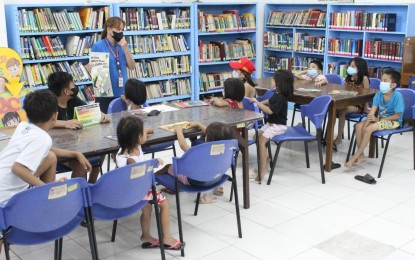
(File photo)
MANILA – The Philippine government reaffirmed its "strong adherence" to the United Nations Convention on the Rights of the Child (CRC) in a two-day constructive dialogue in Geneva, Switzerland.
Reporting on Manila's implementation of CRC before the UN Committee on the Rights of the Child (UNCRC) from September 13 to 14, Council for the Welfare of Children Executive Director Angelo Tapales said: “We have always accorded high importance to our human rights commitments as you can glean from our engagement with stakeholders both at the international and national level.”
“We, at the Council for the Welfare of Children, will continue to support human rights, particularly children's rights. After all, children's rights are human rights," he added.
Over the past two years, Tapales said the Philippines had established "innovative mechanisms" to mitigate the pandemic's impact on children.
These included the activated hotline numbers and online complaint desks for reporting and responding to incidents of violence against children as well as the long-term Basic Education Development Plan 2030.
The pandemic, Tapales said, also did not deter Manila from working on the passage of laws relating to children, including the law prohibiting online sexual abuse or exploitation of children; the Expanded Anti-Trafficking in Persons Act; the Founding Recognition and Protection Act; and the laws instituting a policy of inclusion for learners with disabilities in support of the Inclusive Education Act, among others.
"The enactment of these important pieces of legislation are all informed by the State's respect for genuine, meaningful, and ethical child participation through consultation," he said.
He reported that the Magna Carta of Children, a comprehensive children's human rights law, is also envisioned to be enacted before the current 19th Congress ends its term in 2025, which pave way for the creation of the Philippine Commission on Children and the Child Ombudsman.
On the second day of the dialogue, Tapales said the government has established 115 women and children protection units, responding to cases of violence against children in 59 provinces, as well as, a total of 61 child helplines in 44 provinces nationwide as of August 2022.
He added that measures are being taken to ensure access to inclusive education for children with disabilities.
"In the Philippines, there is a National Strategic Plan on Children with Disabilities. This was developed to serve as the country’s multi-sectoral framework and guide in building an enabling environment where all children with disabilities fully enjoy their rights and develop their full potential," he said.
This plan, he said, has been operational through conferences and the development of various modules, among others.
The Philippines ratified the CRC in August 1990 and has engaged the UNCRC, composed of 18 independent experts, every five years since then.
Tapales led the Philippine delegation at the constructive dialogue together with Philippine Permanent Representative to the UN in Geneva Evan Garcia and Severo Catura, executive director of the Presidential Human Rights Committee Secretariat.
With them are representatives of the Department of Social Welfare and Development, Department of Justice, Department of Health, Philippine National Police-Women and Children Protection Center, Juvenile Justice and Welfare Council, Philippine Commission on Women, and the Supreme Court Office of the Court Administrator.
“The UN engagement is an opportunity to put forward the real and positive picture of the human rights environment in the Philippines, given that we have so much to be proud of and share with the world, among which is on child rights protection,” Catura said.
“And equally important is, we are able to convey the essential message that the promotion, protection and fulfillment of the human rights of Filipino citizens, especially the most vulnerable, are always high on the priority list of the Philippines’ governance agenda,” he added. (PNA)
